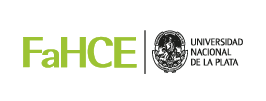Director/a: Viñes, Nicolás
Integrantes:
Luguercho, Sergio
-
Ramírez, Facundo
-
Renati, María Cecilia
Colaboradores/as: Álvarez Silva, Lucía Isabel - Bustos, Wendy - Caldeiro, Martín - Capecce, Jennifer - García, Bianca Agustina - Inama, Juana - Medina Scorza, María Emilia - Perazzo, Soledad Luján - Piriz, Rodrigo
Proyecto de Investigación y Desarrollo (PI+D) financiado por: Universidad Nacional de La Plata (UNLP)
Código: H879 - Fecha de inicio: 01/01/2019 - Fecha de finalización: 31/12/2022
Lugar de trabajo: CICES
ResumenLos estudios de prácticas corporales en la educación superior desde una perspectiva que entienda a éstas como modos de hacer decir y pensar que toman por objeto las acciones del cuerpo, son poco comunes dado el carácter biológico y psicobiológico que toman habitualmente los trabajos en el campo. Aún en las investigaciones más cercanas a las ciencias sociales, el concepto de Prácticas Corporales suele igualarse al de actividad física recurriendo a una epistemología empírico-analítica, que parte de pensar al sujeto como individuo biológico y a la cultura como el medio que lo moldea, es decir, que lo influye, que actúa como un medio (social) de la misma manera como si fuera algo “natural”, es decir, qué se le atribuyen a la cultura las mismas características que a la naturaleza . Como se ha venido demostrando en investigaciones radicadas en el CICES, la revisión crítica de los discursos que se utilizan en planes de estudio y programas de las asignaturas en la Formación Superior, muestra que detrás de los conceptos utilizados se oculta la idea de una naturaleza humana que reduce el cuerpo a un mero receptor de estímulos y a su educación a una herramienta para mejorar las capacidades “naturales”, adquirir valores sociales, tomar conciencia, desarrollar aprendizajes y perfeccionar la belleza entre otros. Nuestra propuesta parte de interpretar el juego como práctica corporal y como contenido a enseñar, para indagar a partir de ello, porqué perduran las formas tradicionales de pensar en contraposición a nuevos puntos de vista que re versionan este hecho y que permitirían mejorar la formación de grado de las prácticas corporales, y por ello, de la propia Educación Corporal. Nuestra idea implica una crítica sobre las definiciones, conceptos, características y relatos que se construyen y circulan en los discursos sobre el juego en los Diseños Curriculares Jurisdiccionales de la Educación Física de la Educación Superior no Universitaria Argentina. La recuperación de estos discursos pretende averiguar cómo se han naturalizado sin los debidos análisis ciertos conceptos y relatos que conforman conocimientos inobjetables. Es menester revisar estas ideas para establecer principios que permitan orientar de mejor manera los saberes que se trasmiten.
Palabras clave: Juego - Game - Corporal Education - Curriculum - Educación Corporal
AbstractStudies of bodily practices in higher education from a perspective that understands them as ways of making say and think that take as their object the actions of the body, are rare because of the biological and psychobiological character that work in the field usually takes. Even in the research closest to the social sciences, the concept of Body Practices is often equated to that of physical activity resorting to an empirical-analytical epistemology, which starts from thinking the subject as a biological individual and culture as the medium that molds it, is to say, that it influences it, that it acts as a (social) medium in the same way as if it were something "natural", that is, what is attributed to culture with the same characteristics as nature. As it has been demonstrated in research based in the CICES, the critical review of the discourses that are used in curricula and programs of the subjects in Higher Education, shows that behind the concepts used is the idea of a human nature that reduces the body to a mere receptor of stimuli and to its education to a tool to improve "natural" capacities, acquire social values, become aware, develop learning and improve beauty among others. Our proposal starts from interpreting the game as a body practice and as a content to teach, to investigate from it, why traditional ways of thinking persist as opposed to new points of view that re version this fact and that would allow to improve the formation of degree of corporal practices, and therefore, of the Body Education itself. Our idea implies a critique of the definitions, concepts, characteristics and stories that are constructed and circulated in the discourses on the game in the Jurisdictional Curricular Designs of the Physical Education of the Higher Education, not University of Argentina. The recovery of these discourses aims to find out how certain concepts and stories that make up unobjectionable knowledge have been naturalized without due analysis. It is necessary to review these ideas in order to establish principles that allow us to better guide the knowledge that is transmitted.
Keywords: Juego - Game - Educación Corporal - Curriculum - Corporal Education
Disciplinas
Educación
Campos de aplicación
Ciencia y Cultura - Sistema Educativo
Especialidad: Educación Física











